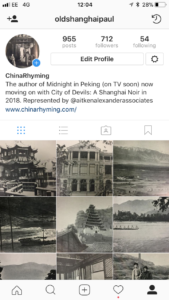Posted: November 16th, 2017 | No Comments »
Monday 20/11/17 – 1pm-2pm
Museum of London
Professor Craig Clunas
China: New Art, New Nation, 1911-1932

As the imperial system collapsed in China, the ‘New Culture Movement’ focused debate on new categories of ‘modernity’ and ‘tradition’. For artists, it posed the questions of what it meant to be both modern and Chinese – challenging them to show how ancient techniques could remain relevant. Artists began to travel abroad (to France, Japan, Germany, Britain and the USA) and become part of an increasingly international ‘art world’. The 1920s in China saw both the political chaos of warlordism, but also a flowering of creativity which drew on the keen awareness by many of China’s potential as part of a global modernism.
Professor Clunas is Visiting Gresham Professor of Chinese Art. He is Professor of History of Art at the University of Oxford. He is a historian of the art and history of China and focuses particularly on the Ming Dynasty (1368-1644).
This lecture is part of the Being Human Festival 2017 which runs from 17th – 25th November.
More information on the festival can be found here: Being Human Festival 2017
Posted: November 15th, 2017 | 2 Comments »
Talking on Norman Ohler’s Blitzed: Drugs in Nazi Germany yesterday I note another claim he makes – in Berlin’s Friedrichstraße in the 1920s (below) Chinese drug dealers from Tsingtao (Qingdao) ran opium dens. This of course is possible – Friedrichstraße did have some opium dens at that time apparently though who ran them I don’t know. Of course Tsingtao was a former German leased territory in Shandong before WW1 and its seizure by Japan. However, Ohler doesn’t provide a reference for that juicy morsel of information and I can find no other reference to Tsingtao dealers in Berlin in English anywhere – any Berlin experts, German researchers know different?

Posted: November 14th, 2017 | No Comments »
Carl Crow in his great Four Hundred Million Customers tells of the travails of European and American pharmaceutical companies in China – piracy, IP violations, fakes, mis-labelling and their own unrealistic dreams of China sales. China in the 1930s had just 25,000 hospital beds – Crow did not successfully launch a single pharmaceutical. I think he gives the specific example of Bayer. Reading Norman Ohler’s Blitzed: Drugs in Nazi Germany a while back he makes reference to Merck, whose cocaine (then legal with a doctor’s prescription) was considered the best in the world. Chinese pirates apparently packaged their own, slightly substandard product, in bottles printed with expertly faked Merck labels…by the million! Ohler cites a 1922 German report on the opium and morphine market.



Posted: November 10th, 2017 | No Comments »
The latest book in my Asian Arguments seris for Zed Books is Benjamin Zawacki’s Thailand: Shifting Ground Between the US and a Rising China….

Thailand was a key ally of the United States after WWII, serving as a bulwark against communism in Southeast Asia and as a base for US troops during the Vietnam War. In return, the US provided it with millions of dollars in military and economic aid, and staunchly supported the country’s various despotic regimes. And yet, the twenty-first century has witnessed a striking reversal in Thailand’s foreign relations: China, once a sworn enemy, is becoming a valued ally to the military government.
In this authoritative modern history, Benjamin Zawacki tells the story of Thailand’s changing role in the world order. Featuring major interviews with high ranking sources in Thailand and the US, including deposed prime minister Thaksin Shinawatra, Thailand is a fascinating insight into the inner workings of the Thai elite and their dealings with the US and China.
Posted: November 10th, 2017 | No Comments »
Just so you know if you read my Crime and the City column for The Literary Hub I’ve put links to all the articles (and will add more as they are published) on Facebook at “Crime and the City’
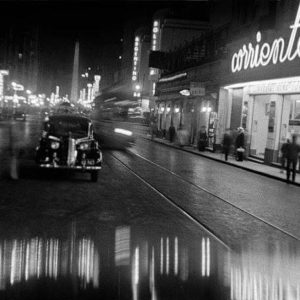
for those that like Asian cities – here are links to the Asian cities covered so far….
Posted: November 8th, 2017 | No Comments »
December 1977 – America – you could go see Star Wars – but who wants that old rubbish ripped off from Louis Cha? It was however a great month for seeing movies across America about “Shanghai”….
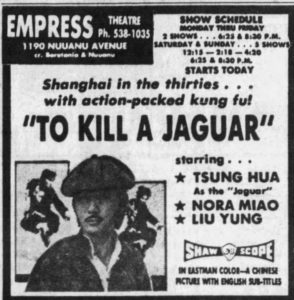
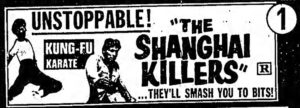

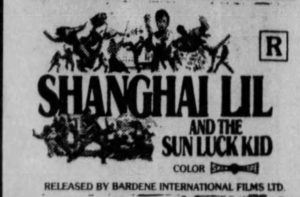
Posted: November 7th, 2017 | No Comments »
Researching U.S. aviators in WWII China
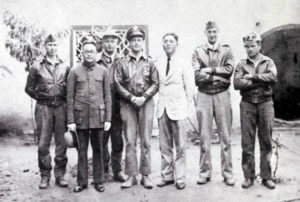
Once upon a time, China and America were allies. Today Sino-US relations are more complex than 75 years ago, yet Chinese President Xi Jinping himself has mentioned the WWII alliance as an icon of friendship between the two peoples, back when “American pilots were rescued by Chinese people”.
Please join us for a discussion by foreign correspondents Melinda Liu and Jon Kaiman about their historical research into American aviators in WWII China, Recently Los Angeles Times Beijing bureau chief Kaiman published an evocative article [LINK] on the tribal residents of a remote corner of Sichuan province who believe a blonde-haired, blue-eyed pilot crash-landed near a village, was rescued by locals — and was kept as a slave for ten years. Kaiman is now writing a book on the topic.
On the other side of China, mostly in coastal Zhejiang province, Liu is researching the experiences in China of U.S. airman known as the Doolittle Raiders, who bombed Tokyo in April 1942. Afterwards the US aviators mostly bailed out in Chinese coastal areas where sympathetic local Chinese — one was Liu’s father — helped hide the Americans from Japanese patrols and guide them to safety. Liu, who is Newsweek’s Beijing Bureau Chief, will show her ten-minute documentary “Doolittle Raiders: A China Story”. Alan Babington-Smith will moderate the discussion.
 This event is co-sponsored by the Royal Asiatic Society Beijing, the Foreign Correspondents’ Club of China (FCCC) and the Bookworm
This event is co-sponsored by the Royal Asiatic Society Beijing, the Foreign Correspondents’ Club of China (FCCC) and the Bookworm
WHAT: Foreign correspondents discuss “Researching U.S. aviators in WWII China”
WHEN:Â Nov. 15, Wednesday, 8:00-9:30 PM
WHERE:Â The Bookworm, Building 4, Nan Sanlitun Road, Chaoyang District, Beijing.
Tel: 6586 9507 MAP link
HOW MUCH:Â Free for members of the RASBJ and FCCC, RMB 40 for Bookworm members (includes welcome drink), RMB 50 for others (includes welcome drink)
RSVP: yoopay:Â https://yoopay.cn/event/60509388






